(完整版)人教八下unit1知识点
最全面人教版八年级下册英语第一单元知识点归纳总结

Unit 1 What's the matter?一、词汇与短语◆重点单词A部分1.matter n. 问题;事情2.sore adj. 疼痛的;酸痛的3.stomachache n. 胃痛;腹痛4.foot n. 脚;足5.neck n. 颈;脖子6.stomach n. 胃;腹部7.throat n. 咽喉;喉咙8.hurt v. (使)疼痛;受伤9.fever n. 发烧10.passenger n. 乘客;旅客11.lie v. 躺;平躺12.break n. 间歇;休息13.rest v. &n. 放松;休息14.onto prep. 向;朝15.X-ray n. X射线;X光16.trouble n. 问题;苦恼17.toothache n. 牙痛18.hit n. (用手或器具)击;打19.headache n. 头痛20.herself pron. (she的反身代词)她自己21.off adv. & prep. 离开(某处);不工作;从……去掉B部分1.bandage n. 绷带v. 用绷带包扎2.press v. 压;挤;按3.sick adj. 生病的;有病的4.knee n. 膝;膝盖5.breathe v. 呼吸6.knife n. 刀7.sunburned adj. 晒伤的8.blood n. 血9.ourselves pron. (we反身代词)我们自己10.mean v. 意思是;打算11.climber n. 登山者;攀登者12.importance n. 重要性;重要13.risk n.&v. 危险;风险;冒险14.decision n. 决定;抉择15.accident n.(交通)事故;意外遭遇16.control v.&n. 限制;约束;管理17.situation n. 情况;状况18.spirit n. 勇气;意志19.kilo( = kilogram) n. 千克;公斤20.death n. 死;死亡21.rock n. 岩石22.nurse n. 护士◆重点短语A部分1.have a cold 感冒2.lie down 躺下3.have a stomachache 胃痛4.take one's temperature 量体温5.have a fever 发烧6.to one's surprise 使……惊讶的是7.get off 下车8.right away 立即;马上9.take breaks (take a break) 休息10.talk too much 说得太多11.drink enough water 喝足够的水12.have a very sore throat 嗓子非常疼13.get an X-ray 拍X光片14.see a dentist 看牙医15.drink some hot tea with honey 喝一些加蜂蜜的热茶16.put some medicine on sth.在……上面敷一些药17.feel very hot 感到很热18.sound like 听起来像19.all weekend 整个周末20.in the same way 以同样的方式21.go to a doctor 看医生22.go along 沿着……走23.on the side of the road 在马路边24.shout for help 大声呼救25.without thinking twice 没有多想26.have a heart problem 有心脏病27.thanks to 多亏了;由于28.in time 及时29.save a life 挽救生命30.get into trouble 陷入麻烦31.hurt oneself 受伤32.fall down落下;摔倒B部分1.be used to 习惯于……;适应于……2.in a difficult situation 在困境中3.take risks (take a risk) 冒险4.keep on doing sth. 继续(或坚持)做某事5.run out (of) 用尽;耗尽6.make a decision 作出决定7.cut off 切除8.get hit on the head 撞到头部9.get out of 离开;从……岀来10.be interested in 对……感兴趣11.give up 放弃12.mean doing sth. 意味着做某事13.put a bandage on sth. 用绷带包扎…14.lose one's life 失去生命15.feel sick 感到恶心16.mountain climbing 登山运动17.have problems breathing 呼吸困难18.be in control of 掌管;管理◆重点句子A部分1.What's the matter with you?=What's the trouble with you?=What's wrong with you?你怎么了?2.What should she do? 她该怎么办呢?3.Did you fall down? 你跌倒了吗?4.Should I take my temperature? 我应该量一下体温吗?5.I think I sat in the same way for too long without moving.我想我以同样的姿势一动不动地坐得太久了。
人教版八年级英语下册Unit1知识点归纳
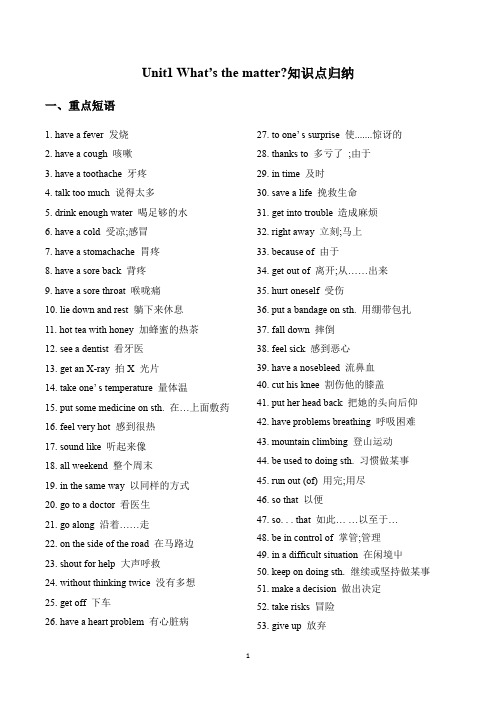
Unit1 What’s the matter?知识点归纳一、重点短语1. have a fever 发烧2. have a cough 咳嗽3. have a toothache 牙疼4. talk too much 说得太多5. drink enough water 喝足够的水6. have a cold 受凉;感冒7. have a stomachache 胃疼8. have a sore back 背疼9. have a sore throat 喉咙痛10. lie down and rest 躺下来休息11. hot tea with honey 加蜂蜜的热茶12. see a dentist 看牙医13. get an X-ray 拍X 光片14. take one’ s temperature 量体温15. put some medicine on sth. 在…上面敷药16. feel very hot 感到很热17. sound like 听起来像18. all weekend 整个周末19. in the same way 以同样的方式20. go to a doctor 看医生21. go along 沿着……走22. on the side of the road 在马路边23. shout for help 大声呼救24. without thinking twice 没有多想25. get off 下车26. have a heart problem 有心脏病27. to one’ s surprise 使.......惊讶的28. thanks to 多亏了;由于29. in time 及时30. save a life 挽救生命31. get into trouble 造成麻烦32. right away 立刻;马上33. because of 由于34. get out of 离开;从……出来35. hurt oneself 受伤36. put a bandage on sth. 用绷带包扎37. fall down 摔倒38. feel sick 感到恶心39. have a nosebleed 流鼻血40. cut his knee 割伤他的膝盖41. put her head back 把她的头向后仰42. have problems breathing 呼吸困难43. mountain climbing 登山运动44. be used to doing sth. 习惯做某事45. run out (of) 用完;用尽46. so that 以便47. so. . . that 如此… …以至于…48. be in control of 掌管;管理49. in a difficult situation 在闲境屮50. keep on doing sth. 继续或坚持做某事51. make a decision 做出决定52. take risks 冒险53. give up 放弃二、用法归纳1.need to do sth.需要去做某事2.see sb. doing sth.看见某人正在做某事3.ask sb. sth.询问某人某事4.expect sb. to do sth.期望某人做某事5.agree to do sth.同意做某事6.help sb. ( to ) do sth.帮助某人做某事7.want to do sth.想要做某事8.tell sb. To do sth.告诉某人做某事9.have problems (in) doing sth.做某事有困难e sth. To do sth. 用某物去做某事11.be/get used to doing sth.习惯于做某事12.seem to do sth.好像做某事13.keep on doing sth.继续做某事14.mind doing sth.介意做某事三、重点句型1. What’ s the matter? 你怎么了?What’ s the matter with you? = What’s the trouble with you? = What’ s wrong with you?2. What should she do? 她该怎么办呢?Should I take my temperature? 我应该量一下体温吗?主语+ should/shouldn’t + 动词原形. ..①You should lie down and rest.你应该躺下休息一会儿。
人教版八年级英语下册各单元知识点总结完整版

Unit 1 What’s the matter?一、重点短语1. have a fever 发烧2. have a cough 咳嗽3. have a toothache 牙疼4. talk too much 说得太多5. drink enough water 喝足够的水6. have a cold 受凉;感冒7. have a stomachache 胃疼8. have a sore back 背疼9. have a sore throat 喉咙痛10. lie down and rest躺下来休息11. hot tea with honey加蜂蜜的热茶12. see a dentist看牙医13. get an X-ray拍X光片14. take one’ s temperature量体温15. put some medicine on sth在……上面敷药16. feel very hot 感到很热17. sound like 听起来像18. all weekend 整个周末19. in the same way以同样的方式20. go to a doctor 看医生21. go along 沿着……走22. on the side of the road 在马路边23. shout for help 大声呼救24. without thinking twice 没有多想25. get off 下车26. have a heart problem 有心脏病27. to one’ s surprise 使……惊讶的28. thanks to 多亏了;由于29. in time及时30. save a life 挽救生命31. get into trouble 造成麻烦32. right away 立刻;马上33. because of 由于34. get out of 离开35. hurt oneself 受伤36. put a bandage on sth. 用绷带包扎37. fall down 摔倒38. feel sick 感到恶心39. have a nosebleed 流鼻血40. cut his knee割伤他的膝盖41. put her head back 把她的头向后仰42.have problems breathing呼吸困难43. mountain climbing登山运动44. be used to doing sth. 习惯做某事45. run out (of) 用完;用尽46. so that 以便47. so…that 如此……以至于……48. be in control of 掌管;管理49. in a difficult situation 在逆境屮50. keep on doing sth.坚持做某事51. make a decision做出决定52. take risks 冒险53. give up 放弃二、知识点解析1. What’s the matter? 怎么了?若是询问“某人怎么了?”要用“What’s the matter with sb.?”拓展:What’s the matter with sb.? 的同义句:What’s wrong with sb.? / What’s the trouble with sb.?2.疾病类短语:have a +疾病. e.g. :have a fever 发烧have a cold 感冒have a cough 咳嗽.have a +身体部位-ache. e.g.: have a headache 头痛have a toothache 牙痛.have a sore+身体部位. e.g.: have a sore throat咽喉痛have a sore back背痛例题:Mom, I____________.I’m sorry to hear that, dear. We must go to see the dentist right away.A. have a headacheB. have a stomachacheC. have a toothacheD. have a fever3. lie down 躺下V. 躺,平躺。
人教版八年级英语下册Unit1知识点
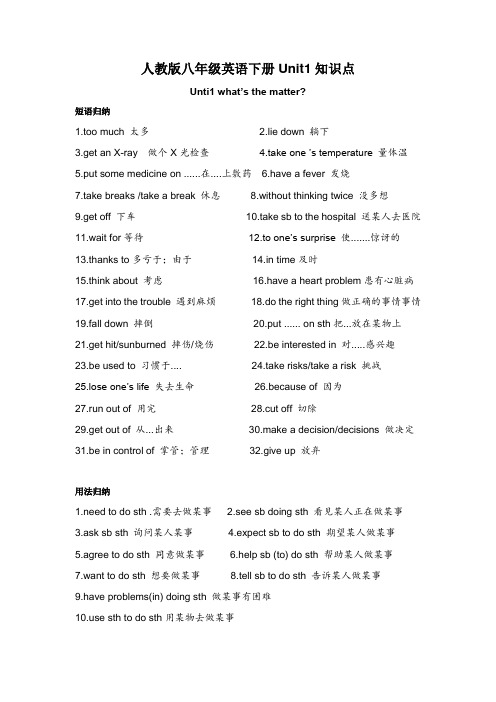
人教版八年级英语下册Unit1知识点Unti1 what’s the matter?短语归纳1.too much 太多2.lie down 躺下3.get an X-ray 做个X光检查4.take one ’s temperature 量体温5.put some medicine on ......在....上敷药6.have a fever 发烧7.take breaks /take a break 休息8.without thinking twice 没多想9.get off 下车10.take sb to the hospital 送某人去医院11.wait for等待12.to one’s surprise 使.......惊讶的13.thanks to多亏于;由于14.in time及时15.think about 考虑16.have a heart problem患有心脏病17.get into the trouble 遇到麻烦18.do the right thing做正确的事情事情19.fall down 摔倒20.put ...... on sth把...放在某物上21.get hit/sunburned 摔伤/烧伤22.be interested in 对.....感兴趣23.be used to 习惯于.... 24.take risks/take a risk 挑战25.lose one’s life 失去生命26.because of 因为27.run out of 用完28.cut off 切除29.get out of 从...出来30.make a decision/decisions 做决定31.be in control of 掌管;管理32.give up 放弃用法归纳1.need to do sth .需要去做某事2.see sb doing sth 看见某人正在做某事3.ask sb sth 询问某人某事4.expect sb to do sth 期望某人做某事5.agree to do sth 同意做某事6.help sb (to) do sth 帮助某人做某事7.want to do sth 想要做某事8.tell sb to do sth 告诉某人做某事9.have problems(in) doing sth 做某事有困难e sth to do sth用某物去做某事11.be/get used to doing sth 习惯于做某事12.seem to do sth 好像做某事13.keep on doing sth 继续做某事14.mind doing sth 介意做某事语法点1.询问某人的健康问题及遇到麻烦的表达方法2.情态动词should的用法3.不定代词的用法精细解读1. What’s the matter (with you)? 怎么了?出什么事了?What’s the trouble/ the problem / wrong with sb./ sth.?2. I had a cold.我感冒了。
(完整word版)人教版英语八年级下册Unit1知识点
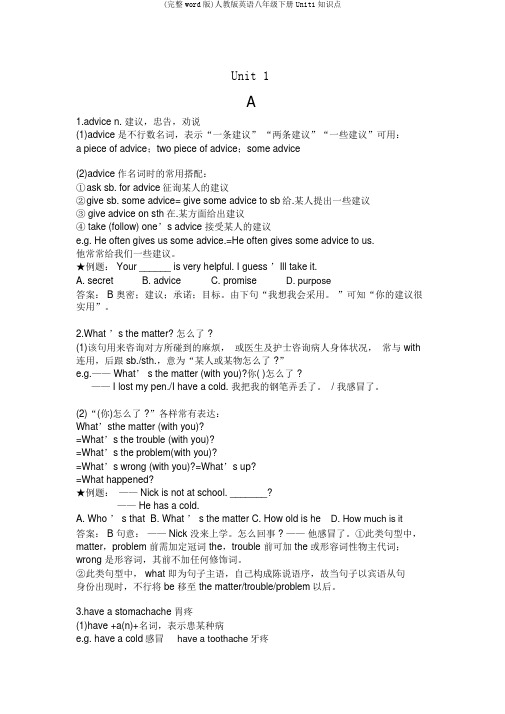
Unit 1A1.advice n. 建议,忠告,劝说(1)advice 是不行数名词,表示“一条建议”“两条建议”“一些建议”可用:a piece of advice;two piece of advice;some advice(2)advice 作名词时的常用搭配:①ask sb. for advice征询某人的建议②give sb. some advice= give some advice to sb给.某人提出一些建议③ give advice on sth在.某方面给出建议④ take (follow) one’s advice 接受某人的建议e.g. He often gives us some advice.=He often gives some advice to us.他常常给我们一些建议。
★例题: Your ______ is very helpful. I guess ’Ill take it.A. secretB. adviceC. promiseD. purpose答案: B 奥密;建议;承诺;目标。
由下句“我想我会采用。
”可知“你的建议很实用”。
2.What ’s the matter? 怎么了 ?(1)该句用来咨询对方所碰到的麻烦,或医生及护士咨询病人身体状况,常与 with 连用,后跟 sb./sth.,意为“某人或某物怎么了 ?”e.g.—— What’ s the matter (with you)?你( )怎么了 ?—— I lost my pen./I have a cold. 我把我的钢笔弄丢了。
/ 我感冒了。
(2)“(你)怎么了 ?”各样常有表达:What’sthe matter (with you)?=What’s the trouble (with you)?=What’s the problem(with you)?=What’s wrong (with you)?=What’s up?=What happened?★例题:—— Nick is not at school. _______?—— He has a cold.A. Who ’ s thatB. What ’ s the matterC. How old is heD. How much is it答案: B 句意:—— Nick 没来上学。
人教八下unit1知识点
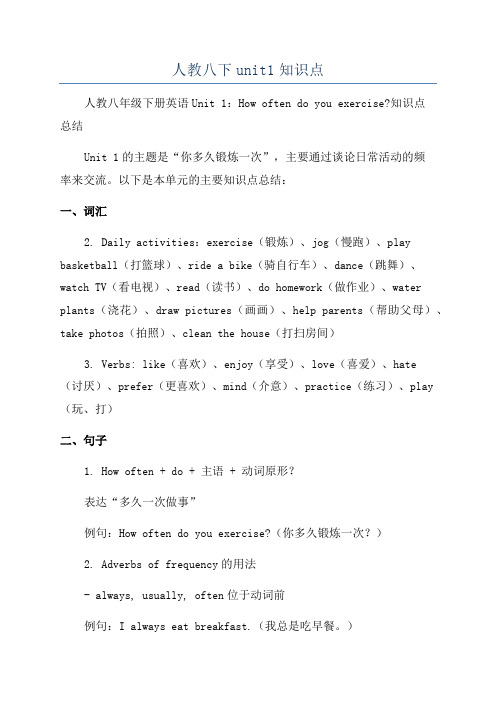
人教八下unit1知识点人教八年级下册英语Unit 1:How often do you exercise?知识点总结Unit 1的主题是“你多久锻炼一次”,主要通过谈论日常活动的频率来交流。
以下是本单元的主要知识点总结:一、词汇2. Daily activities:exercise(锻炼)、jog(慢跑)、play basketball(打篮球)、ride a bike(骑自行车)、dance(跳舞)、watch TV(看电视)、read(读书)、do homework(做作业)、water plants(浇花)、draw pictures(画画)、help parents(帮助父母)、take photos(拍照)、clean the house(打扫房间)3. Verbs: like(喜欢)、enjoy(享受)、love(喜爱)、hate(讨厌)、prefer(更喜欢)、mind(介意)、practice(练习)、play (玩、打)二、句子1. How often + do + 主语 + 动词原形?表达“多久一次做事”例句:How often do you exercise?(你多久锻炼一次?)2. Adverbs of frequency的用法- always, usually, often位于动词前例句:I always eat breakfast.(我总是吃早餐。
)3. I enjoy/like/love/hate + 动名词例句:I enjoy dancing.(我喜欢跳舞。
)4.表示周、月的时间段的用法- on + 星期几例句:I play basketball on Fridays.(我星期五打篮球。
)- on + 日期例句:I have English class on February 1st.(我2月1日有英语课。
)- in + 月份例句:We have a holiday in July.(我们七月有假期。
(完整版)人教八年级下册Unit-1知识点详解,推荐文档

unit 11. What’s the matter (with you)? 怎么了?出什么事了?What’s the trouble/ the problem / wrong with sb./ sth.? = What’s up? = What happens to sb.? 【注】:matter 和trouble 为名词,其前可加the 或形容词性物主代词, wrong 是adj. 不能加the. 【习】:—What’s the matter ______ Tom. He is wet through. —His car ran _______ the river.A.with; inB.to; intoC.with; into【拓展】matter的用法(1) It doesn’t matter 没关系(用来回答别人道歉时的用语)【习】:—I’m very sorry. I broke your tea cup. —__________.A. It doesn’t matterB. You’d better notC. T ake it easyD. It’s too bad(2) as a matter of fact= in fact 事实上, 实际上2.I had a cold. 我感冒了。
疑问&否定have a/an + 疾病名词“患……病”(cold/fever/cough) have an accidenthave a sore ( 因发炎引起的肌肉疼) throat/back 患喉咙/背痛have a heart problemhave a fever 发烧have a cold =catch a cold 患感冒have a stomachache 患胃痛have a toothache患牙痛have a nosebleed 流鼻血have a headache 患头痛have a backache患背痛have a cough咳嗽其他:cut+身体器官hurt+身体器官get hit ( V-ed ) on the head(by sth.)摔在头上【习】:I didn’t sleep well last night, because I _____ a toothache .A. wasB. wentC. hadD. tookhave ( some ) problems ( in ) doing 做某事有困难back n 背;背部at the back of......在......的后面go/come back 返回give back 归还hand n. 手V. 交给;传递hand in hand 手拉手hand in 上交hand on 依次传递hand out 分发3. 身体部位+ache(持续性的疼痛)构成新的复合词stomach+ache=stomachache head+ache=headachetooth+ache=toothache back+ache=backache【习】:Mr. Smith eats ______ food, so he’s _____ fat.A .much too; too muchB .too many; much tooC. too much; too muchD. too much ;much tooenough 的用法(1) adj.足够的,充分的。
人教版八年级下册英语第一单元知识点
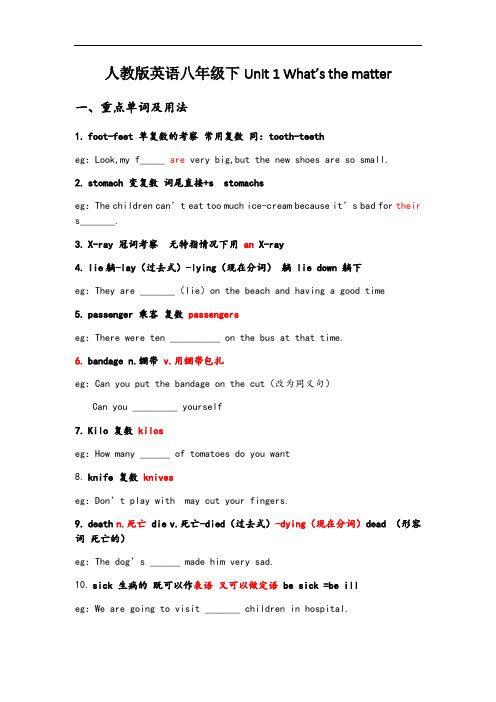
人教版英语八年级下Unit 1 What’s the matter一、重点单词及用法1.foot-feet 单复数的考察常用复数同:tooth-teetheg:Look,my f_____ are very big,but the new shoes are so small.2.stomach 变复数词尾直接+s stomachseg:The children can’t eat too much ice-cream because it’s bad for their s_______.3.X-ray 冠词考察无特指情况下用an X-ray4.lie躺-lay(过去式)-lying(现在分词)躺 lie down 躺下eg:They are _______(lie)on the beach and having a good time5.passenger 乘客复数passengerseg:There were ten __________ on the bus at that time.6.bandage n.绷带v.用绷带包扎eg:Can you put the bandage on the cut(改为同义句)Can you _________ yourself7.Kilo 复数kiloseg:How many ______ of tomatoes do you want8.knife 复数kniveseg:Don’t play with may cut your fingers.9.death n.死亡 die v.死亡-died(过去式)-dying(现在分词)dead (形容词死亡的)eg:The dog’s ______ made him very sad.10.sick 生病的既可以作表语又可以做定语 be sick =be illeg:We are going to visit _______ children in hospital.二、重点短语have a cold =catch a cold =have the flu 感冒 cough 咳嗽lie down 躺下take one’s temperature 量体温 have a fever 发烧take/have breaks/a break 休息=take/have a rest get off 下车-get on 上车to one’s surprise 令某人惊讶的是 right away 立刻马上=right nowget into (trouble)陷入(麻烦) get sunburned 被晒伤be used to (doing)习惯于适应于...... take risks/a risk 去冒险run out (of)用完用尽 cut off 切除get out of 离开从......出来 be in control of 掌管管理give up (doing)放弃(做)某事 have a stomachache 胃痛get an X-ray 做一个X射线检查 thanks to......由于多亏in time 及时 on time 准时 think about 考虑think of认为fall down 摔倒 make a decision 作决定put......on......把....放在...上 be interested in 对...感兴趣三、用法总结1.need to do sth需要做某事eg: The teacher needs_____(rest) for a few minutes.like 意为“听起来像”后接n./adj./句子eg: It sounds like a good idea.类似的感官动词+like:feel like/smell like/ look like/taste like/seem likesound+adj. 结构中,sound 是系动词意为“听起来是”后接形容词eg: That sounds great.+n./doing(v.现在分词) He went to school without having breakfast.eg:He left the classroom without ________ anythingv.同意,赞成agree with sb/某人的意见看法 Does she agree with usagree to do sth 同意做某事 They agreed to solve the problem. problems (in) doing sth做某事有困难=have trouble/difficulty (in) doinghave problems with sth =have trouble/difficulty with sth 在某方面有困难eg:One of my good friends said he had problems__________(learn) English. get used to doing sth 习惯于做某事eg:He used to get up late,but now he is used to getting up early.used to do sth 过去常常做某事(现在不做了)eg:He used to read English in the evening.use sth to do sth 使用用某物做某事eg:So he used knife to cut off his arm.be used to do sth 被动被用于做某事eg:These new pens are used to paint the wall.one’s life 丧失生命 save one’s life 挽救某人的生命eg:He lost his life in the car accident.adj.足够的充足的后接名词n. enough moneyadv.足够地修饰形容词/副词 enough要后置eg:The book is_______,but I don’t have enough money ______it.interesting; to buy enough; to buyenough; buying interesting; buying9. the importance of (doing)sth (做)某事的重要性important adj.重要的 unimportant adj.不重要的 importance n.重要性eg:We students should know the importance of (learning)English. n.决定 make a decision (to do sth)decide to do sth 决定做某事 decide not to do sth 决定不做某事eg:Tom made a decision to study English well.up 放弃give up 是动词+副词结构接代词作宾语时代词放中间eg:The problem is so difficult for you,but don’t _______A.give it up it out up it out itgive up doing sth 放弃做某事eg:You will be very sad if you give up______(sing).用法keep on doing sth 继续做某事(中间有间隔强调重复性)eg:He kept on studying though he was very tired.keep doing sth 继续不停地做某事(不间断连续性)eg:Keep walking until you reach the end of the road.keep sb doing 让某人一直做某事eg:Don’t keep the other students waiting.keep sb from doing sth 阻止某人做某事eg:We should keep the little boy from stepping on the grass.用法find找到,强调寻找的结果 look for强调寻找过程 find out找出查明eg:I was looking for my watch,but I didn’t find it.find sb doing sth 发现某人正在做某事eg:When I walked along the road,I found an old man shouting for help.find it +adj形容词+to do sth 发现做某事是...的eg:She found it hard to finish the work by herself.risks=take a risk 冒险 He likes taking risks.risk one’s life to do 冒着生命危险去做某事eg:He risked his life to save the child.risk doing stheg: The man called Tom often risks flying over the sea.四、短语辨析1.see sb doing sth 看见某人正在做某事(动作正在发生)see sb do sth 看见某人做某事(看到动作全过程或者经常看到动作发生)eg:I saw the boy crying when I passed by(路过).类似的 hear/watch/notice/find+sb do/doing sththanks to 多亏... 由于....=with the help of/with one’s help=because ofthanks for 因.......而感谢强调感谢的原因eg:Thanks to my teacher ,I passed the exam.Thanks for your help .Thanks for inviting me.2.in time 及时表示动作在规定时间内或比规定时间提前发生on time 准时按时指正好在规定时间内eg:Thanks for coming here to help me in time.The train arrived into the station on time.火车准时进站了。
人教版新版八年级英语下册Unit1 知识要点
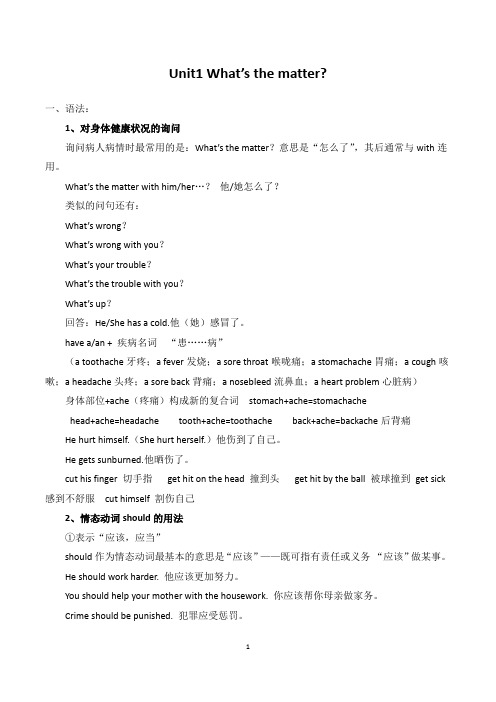
Unit1 What’s the matter?一、语法:1、对身体健康状况的询问询问病人病情时最常用的是:What’s the matter?意思是“怎么了”,其后通常与with连用。
What’s the matter with him/her…?他/她怎么了?类似的问句还有:What’s wrong?What’s wrong with you?What’s your trouble?What’s the trouble with you?What’s up?回答:He/She has a cold.他(她)感冒了。
have a/an + 疾病名词“患……病”(a toothache牙疼;a fever发烧;a sore throat喉咙痛;a stomachache胃痛;a cough咳嗽;a headache头疼;a sore back背痛;a nosebleed流鼻血;a heart problem心脏病)身体部位+ache(疼痛)构成新的复合词stomach+ache=stomachachehead+ache=headache tooth+ache=toothache back+ache=backache后背痛He hurt himself.(She hurt herself.)他伤到了自己。
He gets sunburned.他晒伤了。
cut his finger 切手指get hit on the head 撞到头get hit by the ball 被球撞到get sick 感到不舒服cut himself 割伤自己2、情态动词should的用法①表示“应该,应当”should作为情态动词最基本的意思是“应该”——既可指有责任或义务“应该”做某事。
He should work harder. 他应该更加努力。
You should help your mother with the housework. 你应该帮你母亲做家务。
(完整版)Unit1人教版八年级英语下册语法与知识点,推荐文档

Unit 1第一部分:Grammar一、情态动词(Modal Verbs)情态动词should 意为“应该,应当”,必须和后面的动词原形一起构成谓语,没有人称和数的变化。
用以表达职责和义务、提出劝告,而且表述的是自己的主观看法。
注意:should 在以why,who,how 等疑问词开头的问句中,意为“竟然,居然,怎么会”,表示意外、惊喜或在说话人看来是不可思议的。
三、反身代词表示反射或强调的代词叫做反身代词。
反身代词是由第一人称、第二人称形容词性物主代词或第三人称代词的宾格形式,词尾加self 或selves 组成。
反身代词可译“本人”、“本身”,为加强语气,也常翻译为“亲自”、“自己”。
不定人称代词one ---- o neself.第二部分:单词用法Section A1.What’s the matter?怎么了?该句常用询问某人患了何种疾病或遇到了什么麻烦,其后用with 引出对象。
1). What’s the matter with sb.?=what’s wrong with sb.?=what’s the trouble/problem with sb.?=what’s one’s trouble/problem?e.g. What’s the matter w ith Tom?=what’s with Tom?=What’s the with Tom?=What’s Tom’s?2). matter, 名词,“问题,事情”e.g. We have important (matter) to discuss.我们有些重要的问题要讨论。
3). 动词,“要紧,关系重大”e.g. It dosen’t that you came late.2.I have a cold. 我感冒了。
1).have/get/catch a cold “感冒,着凉”The old man a cold yesterday.那位老人昨天感冒了。
人教版八年级下1单元必背知识点

八年级下第1单元知识点1.定语从句①定义:定语从句在句子中作定语,修饰一个名词或者代词,被修饰的名词或者代词即先行词。
定语从句通常出现在先行词之后,由关系代词或关系副词引出:who、whom、whose、that、which、when、why、where等。
①用法:A.当先行词与人有关时,引导词可以用关系代词:who(作从句主语),that(作从句的宾语、主语),whom(作从句的宾语),whose。
*He is the man who/that can control everything made of iron。
“他是那个能控制一切由铁制成的男人。
”(who/that在从句中作主语。
)*He is the man whom/that I want to visit in the future.“他是我未来想要拜访的人。
”(whom/that 在从句中作visit的宾语。
)*He helped the man whose car is super cool.“他帮助了一个拥有超酷的车的人。
”B.当先行词与物有关时,引导词可以用关系代词that、which。
*A prosperity which/that had never been seen before appears in the countryside.“农村出现了前所未有的繁荣。
”(which/that 在从句中作主语。
)*The package (which/that)you are carrying is about to come unwrapped.“你拿的包裹快散了。
”(which/that在从句中作宾语。
)C.当先行词表示地点时,引导词用关系副词where/介词+which。
Eg:I like this city where(in which)I have stayed for more than ten years.“我喜欢这了我已经呆了十年以上的城市。
人教版英语八年级下册Unit1 知识点精讲
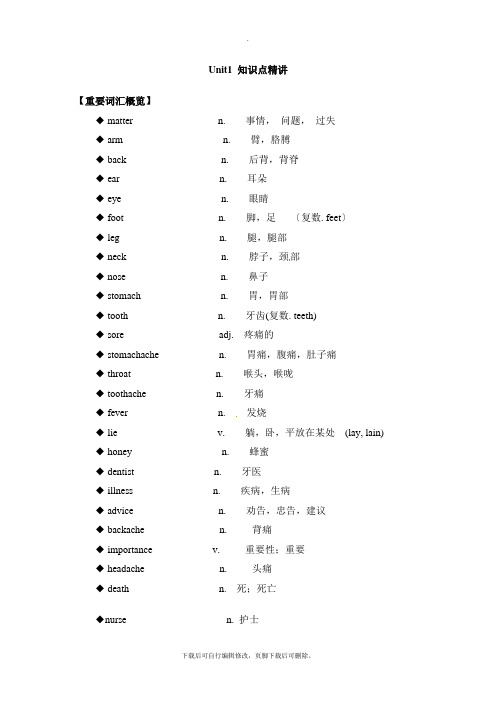
Unit1 知识点精讲【重要词汇概览】◆ matter n.事情,问题,过失◆ arm n.臂,胳膊◆ back n.后背,背脊◆ ear n.耳朵◆ eye n.眼睛◆ foot n.脚,足〔复数. feet〕◆ leg n.腿,腿部◆ neck n.脖子,颈部◆ nose n.鼻子◆ stomach n.胃,胃部◆ tooth n.牙齿(复数. teeth)◆ sore adj.疼痛的◆ stomachache n.胃痛,腹痛,肚子痛◆ throat n.喉头,喉咙◆ toothache n.牙痛◆ fever n.发烧◆ lie v.躺,卧,平放在某处(lay, lain)◆ honey n.蜂蜜◆ dentist n.牙医◆ illness n.疾病,生病◆ advice n.劝告,忠告,建议◆ backache n.背痛◆ importance v. 重要性;重要◆ headache n. 头痛◆ death n. 死;死亡◆nurse n. 护士◆ knife n. (复数.knives)刀【重要词组概览】◆ have a cold患感冒◆ take breaks(take a break) 休息◆ lie down 躺下◆ get off 下车◆ be used to 习惯于...;适应于...◆ on the other hand另一方面◆ get a cold患感冒◆ see a dentist看牙医◆take one’s temperature 量体温◆ make sb sick使某人不舒服(患锁病)◆ have a sore throat嗓子痛◆ have a fever发烧,发热◆ have a toothache牙痛◆ have a backache背痛◆ have a headache头痛◆give up 放弃◆cut off 切除◆get out 〔of〕用尽;耗尽◆take risks〔take a risk〕冒险◆get into 陷入;参与◆right away 立即;马上◆to one’s s urprise 使...惊讶的;出乎...意料【语法知识聚焦】看病需要和医生交流,这是英语口语中必不可少的内容。
人教版八年级英语下册 Unit1 知识点讲解
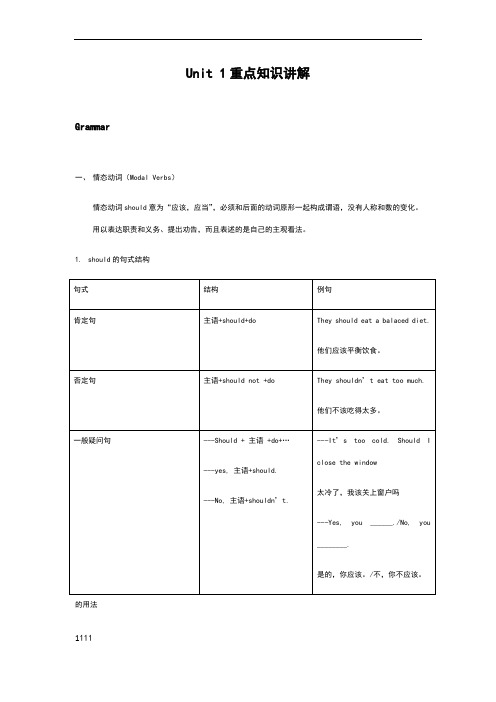
Unit 1重点知识讲解Grammar一、情态动词(Modal Verbs)情态动词should意为“应该,应当”,必须和后面的动词原形一起构成谓语,没有人称和数的变化。
用以表达职责和义务、提出劝告,而且表述的是自己的主观看法。
1.should的句式结构的用法注意:should在以why,who,how等疑问词开头的问句中,意为“竟然,居然,怎么会”,表示意外、惊喜或在说话人看来是不可思议的。
二、其他表示建议的句型三、反身代词表示反射或强调的代词叫做反身代词。
反身代词是由第一人称、第二人称形容词性物主代词或第三人称代词的宾格形式,词尾加self或selves组成。
反身代词可译“本人”、“本身”,为加强语气,也常翻译为“亲自”、“自己”。
不定人称代词one-----oneself.1、反身代词的分类2、反身代词的用法单词的用法Section A1.What’s the matter怎么了该句常用询问某人患了何种疾病或遇到了什么麻烦,其后用with引出对象。
1). What’s the matter with sb.=what’s wrong with sb.=what’s the trouble/problem with sb.=what’s one’s trouble/problem. What’s the matter with Tom=what’s _________ with Tom=What’s the _________ with Tom=What’s Tom’s _________2). matter, 名词,“问题,事情”. We have important _________(matter) to discuss.我们有些重要的问题要讨论。
3). 动词,“要紧,关系重大”. It dosen’t _________ that you came late.2.I have a cold.我感冒了。
(完整版)人教版八年级英语下册Unit1知识点讲解(可编辑修改word版)

Unit 1 重点知识讲解Grammar一、情态动词(Modal Verbs)情态动词should 意为“应该,应当”,必须和后面的动词原形一起构成谓语,没有人称和数的变化。
用以表达职责和义务、提出劝告,而且表述的是自己的主观看法。
1.should 的句式结构2.s hould 的用法喜或在说话人看来是不可思议的。
二、其他表示建议的句型表示反射或强调的代词叫做反身代词。
反身代词是由第一人称、第二人称形容词性物主代词或第三人称代词的宾格形式,词尾加self 或selves 组成。
反身代词可译“本人”、“本身”,为加强语气,也常翻译为“亲自”、“自己”。
不定人称代词one ---- oneself.1、反身代词的分类2、反身代词的用法单词的用法Section A1.What’s the matter?怎么了?该句常用询问某人患了何种疾病或遇到了什么麻烦,其后用with 引出对象。
1). What’s the matter with sb.?=what’s wrong with sb.?=what’s the trouble/problem with sb.?=what’s one’s trouble/problem?e.g. What’s the matter with Tom?=what’s with Tom?=What’s the with Tom?=What’s Tom’s?2). matter, 名词,“问题,事情”e.g. We have important (matter) to discuss.我们有些重要的问题要讨论。
3). 动词,“要紧,关系重大”e.g. It dosen’t that you came late.2.I have a cold.我感冒了。
1).have/get/catch a cold “感冒,着凉”The old man a cold yesterday.那位老人昨天感冒了。
人教版英语八年级下册第一单元Unit 1知识点
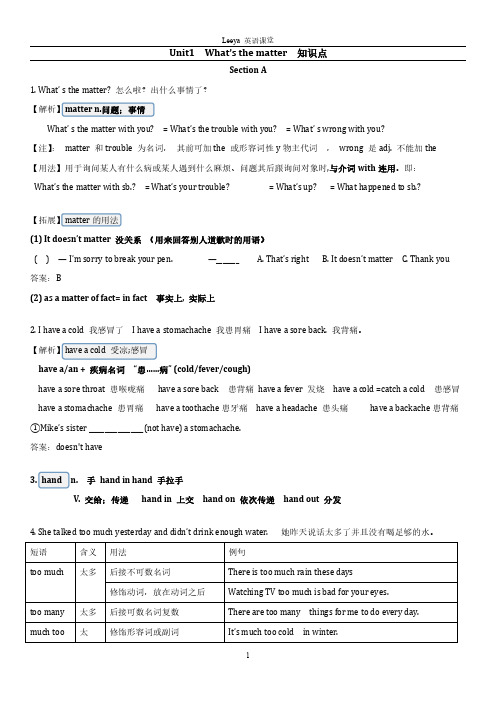
Unit1What’s the matter知识点Section A1.What’s the matter?怎么啦?出什么事情了?【解析】matter n.问题;事情What’s the matter with you?=What’s the trouble with you?=What’s wrong with you?【注】:matter和trouble为名词,其前可加the或形容词性y物主代词,wrong是adj.不能加the【用法】用于询问某人有什么病或某人遇到什么麻烦、问题其后跟询问对象时,与介词with连用。
即:What’s the matter with sb.?=What’s your trouble?=What’s up?=What happened to sb.?【拓展】matter的用法(1)It doesn’t matter没关系(用来回答别人道歉时的用语)()—I’m sorry to break your pen.—_______ A.That’s right B.It doesn’t matter C.Thank you 答案:B(2)as a matter of fact=in fact事实上,实际上2.I have a cold我感冒了I have a stomachache我患胃痛I have a sore back.我背痛。
【解析】have a cold受凉;感冒have a/an+疾病名词“患……病”(cold/fever/cough)have a sore throat患喉咙痛have a sore back患背痛have a fever发烧have a cold=catch a cold患感冒have a stomachache患胃痛have a toothache患牙痛have a headache患头痛have a backache患背痛①Mike’s sister_________________(not have)a stomachache.答案:doesn't have3.hand n.手hand in hand手拉手V.交给;传递hand in上交hand on依次传递hand out分发4.She talked too much yesterday and didn’t drink enough water.她昨天说话太多了并且没有喝足够的水。
(完整版)人教版八年级英语下册Unit1知识点讲解.doc
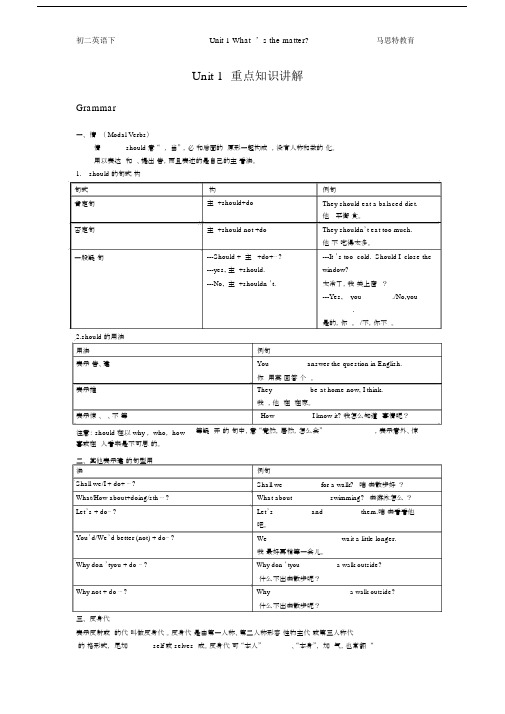
初二英语下Unit 1 What ’s the matter?马思特教育Unit 1 重点知识讲解Grammar一、情( Modal Verbs)情should 意“ ,当” ,必和后面的原形一起构成,没有人称和数的化。
用以表达和、提出告,而且表述的是自己的主看法。
1.should 的句式构句式构例句肯定句主 +should+do They should eat a balaced diet.他平衡食。
否定句主 +should not +do They shouldn’t eat too much.他不吃得太多。
一般疑句---Should + 主 +do+⋯ ? ---It ’s too cold. Should I close the---yes, 主 +should. window?---No, 主 +shouldn ’t. 太冷了,我关上窗?---Yes, you ______./No,you________.是的,你。
/不,你不。
2.should 的用法用法例句表示告、建You _________ answer the question in English.你用英回答个。
表示推表示惊、、不等注意: should 在以 why , who, how 喜或在人看来是不可思的。
二、其他表示建的句型用法Shall we/I + do+ ⋯ ?What/How about+doing/sth ⋯ ? Let’s + do⋯ ?You’d/We’d better (not) + do⋯ ?They _________ be at home now, I think.我,他在在家。
How _________ I know it? 我怎么知道事情呢?等疑开的句中,意“竟然,居然,怎么会”,表示意外、惊例句Shall we _________ for a walk?咱去散步好?What about _________ swimming?去游泳怎么?Let’s _________ and _________ them.咱去看看他吧。
人教版八年级下册unit1知识点总结
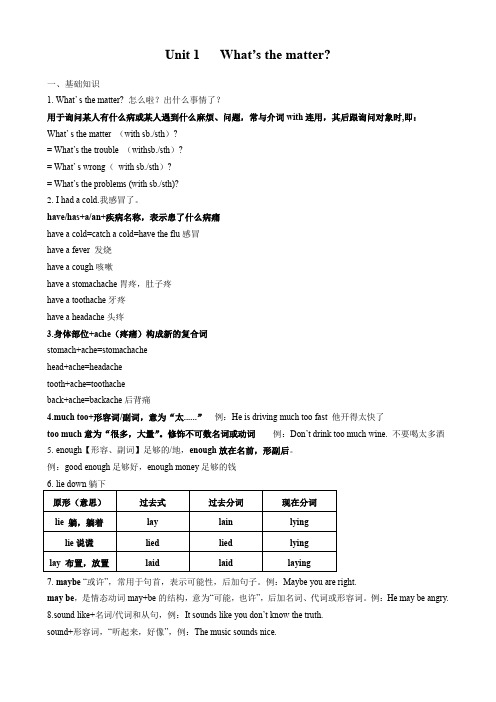
Unit 1 What’s the matter?一、基础知识1. What’ s the matter? 怎么啦?出什么事情了?用于询问某人有什么病或某人遇到什么麻烦、问题,常与介词with连用,其后跟询问对象时,即:What’ s the matter (with sb./sth)?= What’s the trouble (withsb./sth)?= What’ s wrong(with sb./sth)?= What’s the problems (with sb./sth)?2.I had a cold.我感冒了。
have/has+a/an+疾病名称,表示患了什么病痛have a cold=catch a cold=have the flu感冒have a fever 发烧have a cough咳嗽have a stomachache胃疼,肚子疼have a toothache牙疼have a headache头疼3.身体部位+ache(疼痛)构成新的复合词stomach+ache=stomachachehead+ache=headachetooth+ache=toothacheback+ache=backache后背痛4.much too+形容词/副词,意为“太......”例:He is driving much too fast 他开得太快了too much意为“很多,大量”。
修饰不可数名词或动词例:Don’t drink too much wine. 不要喝太多酒5.enough【形容、副词】足够的/地,enough放在名前,形副后。
例:good enough足够好,enough money足够的钱7. maybe “或许”,常用于句首,表示可能性,后加句子。
例:Maybe you are right.may be,是情态动词may+be的结构,意为“可能,也许”,后加名词、代词或形容词。
- 1、下载文档前请自行甄别文档内容的完整性,平台不提供额外的编辑、内容补充、找答案等附加服务。
- 2、"仅部分预览"的文档,不可在线预览部分如存在完整性等问题,可反馈申请退款(可完整预览的文档不适用该条件!)。
- 3、如文档侵犯您的权益,请联系客服反馈,我们会尽快为您处理(人工客服工作时间:9:00-18:30)。
Unit1 What’s the matter?重点短语1.have a fever 发烧2. have a cough 咳嗽3. have a toothache 牙疼4. talk too much 说得太多5. drink enough water 喝足够的水6. have a cold 受凉;感冒7. have a stomachache 胃疼8. have a sore back 背疼9. have a sore throat 喉咙痛10. lie down and rest 躺下来休息11. hot tea with honey 加蜂蜜的热茶12. see a dentist 看牙医13. get an X-ray 拍X 光片14. take one’ s temperature 量体温15. put some medicine on sth. 在……上面敷药16. feel very hot 感到很热17. sound like 听起来像18. all weekend 整个周末19. in the same way 以同样的方式20. go to a doctor 看医生21. go along 沿着……走22. on the side of the road 在马路边23. shout for help 大声呼救24. without thinking twice 没有多想25. get off 下车26. have a heart problem 有心脏病27. to one’ s surprise 使....... 惊讶的28. thanks to 多亏了;由于29. in time 及时30. save a life 挽救生命31. get into trouble 造成麻烦32. right away 立刻;马上33. because of 由于34. get out of 离开;从……出萍35. hurt oneself 受伤36. put a bandage on sth. 用绷带包扎37. fa ll down 摔倒38. feel sick 感到恶心39. have a nosebleed 流鼻血40. cut his knee 割伤他的膝盖41. put her head back 把她的头向后仰42. have problems breathing 呼吸困难43. mountain climbing 登山运动44. be used to doing sth. 习惯做某事45. run out (of) 用完;用尽46. so that 以便47. so. . . that 如此… …以至于…48. be in control of 掌管;管理49. in a difficult situation 在闲境中50. keep on doing sth. 继续或坚持做某事51. make a decision 做出决定52. take risks 冒险53. give up 放弃Section A1. What’ s the matter? 怎么啦?出什么事情了?【解析】matter/ ' mætə(r)) /n.问题;事情What’ s the matter with you?= Wh at’s the trouble with you?= What’ s wrong with you?你怎么了?【注】:matter 和trouble 为名词,其前可加the 或形容词性物主代词,wrong 是adj.不能加the 【用法】用于询问某人有什么病或某人遇到什么麻烦、问题其后跟询问对象时,与介词with连用。
即:What’s the matter with sb.?= What’s your trouble?= What’s up?= What happens to sb.?【拓展】matter的用法(1) It doesn’t matter 没关系(用来回答别人道歉时的用语)(2) as a matter of fact= in fact 事实上, 实际上2. I have a cold 我感冒了I have a stomachache 我患胃痛I have a sore back. 我背痛。
【解析1】have a cold 受凉;感冒have a/an + 疾病名词“患……病”(cold/fever/cough)have a sore throat 患喉咙痛have a sore back 患背痛have a fever 发烧have a cold =catch a cold 患感冒have a stomachache 患胃痛have a toothache患牙痛have a headache 患头痛have a backache患背痛【解析2】back n 背;背部at the back of......在......的后面go/come back 返回give back 归还3.hand n 手hand in hand 手拉手V 交给;传递hand in 上交hand on 依次传递hand out 分发4. She talked too much yesterday and didn’t drink enough water.她昨天说话太多了并且没有喝足够的水。
【解析2】enough 的用法(1) adj.足够的,充分的修饰名词时,可放在名词之前或之后enough time(2) adv. “足够地,十分,相当”修饰adj./adv,放在adj./adv 后expensive enough(3) be +adj. +enough to do sth be strong enough to carry the box.5. drink some hot tea with honey. 喝一些加蜂蜜的热茶。
【解析】with :⑴prep “具有,带有” , 表示某物带有或具有某种特征。
She is a girl with long hair.with (反)without⑵prep. 和......一起I like to talk freely with my friends.⑶ prep 用......,表示“使用某种工具”Cut it with a knife.6. see a dentist and get an x- ray. 看牙医并且拍张x光。
【解析1】see a dentist = go to a dentist看牙医see a doctor = go to a doctor 看医生【解析2】X-ray/'eks rei/n. X 射线;X 光7. What should she do?她该怎么办呢?Should I take my temperature?我应该量一下体温吗?【解析1】should “应该” 情态动词,后跟动词原形,表示责任和义务,没有人称和数的变化,多用于表示劝告或建议。
否定形式:should not =shouldn’t 不应该主语+ should/ shouldn’t + 动词原形. ..变成一般疑问句时将should提到句首。
①You should lie down and rest. 你应该躺下休息一会儿。
②You shouldn’t’ t go out at night.你晚上不应该出去。
【解析2】take one’s temperature 量体温8. No, it doesn’t sound like you have a fever. 不需要,听起来你不像发烧了。
【解析1】sound like 听起来像,后接名词或名词性短语作表语。
sound like+名词代词和从句It sounds like a good idea.It sounds like you don’t know the truth.sound +形容词,“听起来,好像”【拓展】“感官动词+ likefeel like 摸起来像smell like 闻起来像look like 看起来像taste like 尝起来像【解析2】fever/ 'fi:vɜ:(r)/n.发烧have a fever 发烧You need to take breaks away from the computer.你需要休息一下,远离电脑。
9. You need to take break away from the computer.你需要远离电脑,休息休息。
【解析1】need v 需要◆用于肯定句是实义动词。
变成否定句或疑问句,要借助助动词do/does/did(1) need sth 需要某物I need your help.(2) 人做主语,sb need to do sth 某人需要做某事Do you need to drink more water?(3) 物做主语,sth need doing sth = sth need to be done 某物需要被做My TV set needs repairing.◆need用于否定句是情态动词,后跟动词原形。
needn’t = don’t have to 没有必要must 开头的一般疑问句,肯定回答用must,否定回答用needn’t【解析2】take breaks=take a break=have a break休息一下9. I think I sat in the same way for too long without moving. 我想我以同样的姿势一动不动地坐得太久了。
【解析】without doing sth. 没有做某事(反)with (后跟Ving ) in the same way 以同样的方式【拓展】与way 相关的短语:all the way 一路上 by way of 经由,通过…方式 in no way 决不 get in the way 挡道by the way 顺便提一下,另外 in one ’s/the way 妨碍,阻碍 in a way 在某点,某种程度上 in this way 用这种方法 lead the way 带路,引路 lose one ’s way 迷路 on the/one ’s way(to) 在去…的路上10.If your head and neck still hurt tomorrow, then go to a doctor. 如果你的头和脖子明天还疼的话, 就去看医生。
